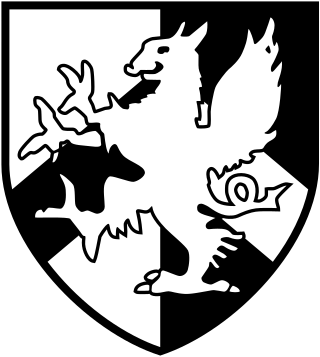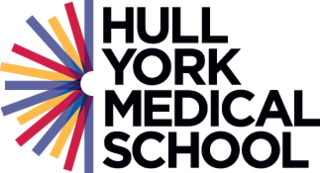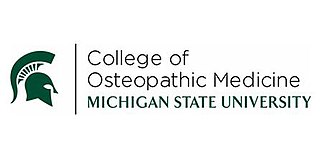Related Research Articles

A general practitioner (GP) or family physician is a doctor who is a consultant in general practice.
A Doctor of Medicine is a medical degree, the meaning of which varies between different jurisdictions. In the United States, and some other countries, the M.D. denotes a professional degree. This generally arose because many in 18th-century medical professions trained in Scotland, which used the M.D. degree nomenclature. In England, however, Bachelor of Medicine, Bachelor of Surgery (M.B.B.S.) was used: in the 19th century, it became the standard in Scotland too. Thus, in the United Kingdom, Ireland and other countries, the M.D. is a research doctorate, honorary doctorate or applied clinical degree restricted to those who already hold a professional degree (Bachelor's/Master's/Doctoral) in medicine. In those countries, the equivalent professional degree to the North American, and some others' usage of M.D. is still typically titled Bachelor of Medicine, Bachelor of Surgery.
A medical school is a tertiary educational institution, professional school, or forms a part of such an institution, that teaches medicine, and awards a professional degree for physicians. Such medical degrees include the Bachelor of Medicine, Bachelor of Surgery, Master of Medicine, Doctor of Medicine (MD), or Doctor of Osteopathic Medicine (DO). Many medical schools offer additional degrees, such as a Doctor of Philosophy (PhD), master's degree (MSc) or other post-secondary education.

Barts and The London School of Medicine and Dentistry, commonly known as Barts or BL, is a medical and dental school in London, England. The school is part of Queen Mary University of London, a constituent college of the federal University of London, and the United Hospitals. It was formed in 1995 by the merger of the London Hospital Medical College and the Medical College of St Bartholomew's Hospital.

Residency or postgraduate training is a stage of graduate medical education. It refers to a qualified physician, veterinarian, dentist, podiatrist (DPM) or pharmacist (PharmD) who practices medicine or surgery, veterinary medicine, dentistry, podiatry, or clinical pharmacy, respectively, usually in a hospital or clinic, under the direct or indirect supervision of a senior medical clinician registered in that specialty such as an attending physician or consultant.
A number of professional degrees in dentistry are offered by dental schools in various countries around the world.

Doctor in the House is a 1954 British comedy film directed by Ralph Thomas and starring Dirk Bogarde, Kenneth More, Donald Sinden, Donald Houston and James Robertson Justice. It was produced by Betty Box. The screenplay, by Nicholas Phipps, Richard Gordon and Ronald Wilkinson, is based on the 1952 novel Doctor in the House by Gordon, and follows a group of students through medical school.

In the United Kingdom, medical school generally refers to a department within a university which is involved in the education of future medical practitioners. All leading British medical schools are state-funded and their core purpose is to train doctors on behalf of the National Health Service. Courses generally last four to six years: two years of pre-clinical training in an academic environment and two to three years clinical training at a teaching hospital and in community settings. Medical schools and teaching hospitals are closely integrated. The course of study is extended to six years if an intercalated degree is taken in a related subject.

Hull York Medical School (HYMS) is a medical school in England which took its first intake of students in 2003. It was opened as a part of the British government's attempts to train more doctors, along with Brighton and Sussex Medical School, Peninsula Medical School and University of East Anglia Medical School. It is the joint medical school of the Universities Hull and York. The University of Hull was rated Gold in the Teaching Excellence Framework 2023 as was the University of York. The latter is also a member of the Russell Group; an association of 24 world class, research intensive universities.

Medical education in Australia includes the educational activities involved in the initial and ongoing training of Medical Practitioners. In Australia, medical education begins in Medical School; upon graduation it is followed by a period of pre-vocational training including Internship and Residency; thereafter, enrolment into a specialist-vocational training program as a Registrar eventually leads to fellowship qualification and recognition as a fully qualified Specialist Medical Practitioner. Medical education in Australia is facilitated by Medical Schools and the Medical Specialty Colleges, and is regulated by the Australian Medical Council (AMC) and Australian Health Practitioner Regulation Agency (AHPRA) of which includes the Medical Board of Australia where medical practitioners are registered nationally.
The London School of Medicine for Women (LSMW) established in 1874 was the first medical school in Britain to train women as doctors. The patrons, vice-presidents, and members of the committee that supported and helped found the London School of Medicine for Women wanted to provide educated women with the necessary facilities for learning and practicing midwifery and other branches of medicine while also promoting their future employment in the fields of midwifery and other fields of treatment for women and children.
The University of St Andrews School of Medicine is the school of medicine at the University of St Andrews in St Andrews, Fife, Scotland and the oldest medical school in Scotland.

Richard Gordon, was an English ship's surgeon and anaesthetist. As Richard Gordon, Ostlere wrote numerous novels, screenplays for film and television and accounts of popular history, mostly dealing with the practice of medicine. He was best known for a long series of comic novels on a medical theme beginning with Doctor in the House, and the subsequent film, television, radio and stage adaptations. His The Alarming History of Medicine was published in 1993, and he followed this with The Alarming History of Sex.
Warwick Medical School is the medical school of the University of Warwick and is located in Coventry, United Kingdom. It was opened in 2000 in partnership with Leicester Medical School, and was granted independent degree-awarding status in 2007.
Michael O'Donnell was a British physician, journalist, author and broadcaster.
St Mary's Hospital Medical School was the youngest of the constituent medical schools of Imperial College School of Medicine, founded in 1854 as part of the new hospital in Paddington. During its existence in the 1980s and 1990s, it was the most popular medical school in the country, with an application to place ratio of 27:1 in 1996.

The Michigan State University College of Osteopathic Medicine (MSUCOM) is one of the two public medical schools of Michigan State University, a public land-grant research university in East Lansing, Michigan. The college grants the Doctor of Osteopathic Medicine (D.O.) degree, as well as a DO-PhD combined degree for students interested in training as physician-scientists. MSUCOM operates two satellite campuses in Clinton Township and Detroit. The college is accredited by the American Osteopathic Association's Commission on Osteopathic College Accreditation (COCA) and by the Higher Learning Commission.
Rosemary Anne Leonard is a British general practitioner and journalist.

Medical education in Wales is the education of medical students and qualified medical doctors in Wales.
The North Wales Medical School is a medical school at Bangor University in North Wales. It currently teaches Biomedical Science, Medical Sciences, Physician Associate studies and Pharmacology. Student intake for Medicine commences in September 2024, and Pharmacy in September 2025.
References
- 1 2 Spindler. 1992. Acknowledgements. vii–viii.
- ↑ Spindler. 1992. pages 1–3.
- ↑ "Television Nominations 1992". British Academy of Film and Television Arts. 1992. Retrieved 10 April 2010.
- ↑ "Episodes from Doctors to Be: 20 Years On broadcast in 2007". BBC. Retrieved 10 April 2010.
- ↑ Spindler. 1992. page 2.
- ↑ Spindler. 1992. pages 14–15.
- ↑ Spindler. 1992. pages 16–18.
- ↑ Spindler. 1992. page 23–24.
- ↑ Spindler. 1992. pages 20–22.